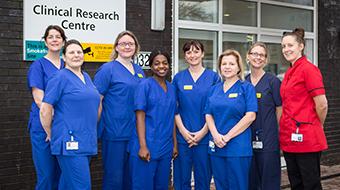Want to have your say? Listening to you, helps us too
Taking part in research doesn’t necessarily mean being treated as part of a study.
At NBT we have a variety of groups involving members of the public who help us to review and improve the care we give to our patients.
Your involvement helps to ensure that our focus remains on what is most important – the people we look after. We believe that people with personal experience of healthcare are best placed to comment on what research is needed and how research should be done.
You don't need any research experience to join, just fresh perspectives that can guide our researchers, helping to make our research more relevant and acceptable to the people who use our services.
You will be able to:
- Comment on the researcher’s treatment ideas.
- Discuss how the treatment will be carried out.
- Read and give feedback on patient information sheets, letters to patients and patient questionnaires.
- Keep updated on how the research study is progressing.
You can be involved as much or as little as you wish, depending on your personal circumstances. Each group is different, with some meeting for approximately 2 hours every 8 weeks, and others meeting just once or twice in total.
Please see the some of our Current Opportunities below.
If you are interested in a particular health condition that is not listed below, please do get in touch by emailing researchcommunications@nbt.nhs.uk
Women & Children's groups
Our team does not just involve patients as Research/Trial participants. We are also committed to involving the public in every stage of a research project’s journey. From the development of an idea, through to the sharing of a project’s findings, we feel strongly that consistent involvement and engagement with our public partners in our research will result in high quality projects that are focussed on patients, and with outcomes that are important to them. We want to address real world healthcare challenges and improve care, but we can only do this by understanding and listening to a wide range of opinions and by ensuring we have a culture that encourages patient driven ideas.
We are always keen to expand our Public Involvement Group and have new members join us!
Who is this opportunity for?
Patients with experience of Obstetrics/Gynaecology/Maternity services or members of the public with an interest in improving Women & Children’s Health and Care through research. We also have project-specific groups whose members may have a particular condition or experience – please contact us and we can keep you up to date with any relevant projects.
How you can be involved.
The Research Unit will host face-to-face meetings, video chats or can discuss projects via phone or email, if you prefer. We like to encourage discussions with researchers about their project ideas and research approaches; we ask for help reviewing research summaries and other research documentation; and also want to hear your general “lived experience” perspective to advise our research staff and clinicians on how best to deliver our projects. We can provide training to support your involvement in our projects, as required.
When?
The dates and times of all the meetings/activities will be agreed in advance and we will endeavour to give as much notice as we can. Timings will be varied and flexible to accommodate the group.
Where?
Face-to-face meetings are sometimes held in the Learning & Research building at Southmead Hospital. However, we also like to choose the most suitable venue for the group that is meeting – these can be less formal and, for example, more child-friendly, if required.
If you are interested in being involved in our general and/or or a specific project’s Public Involvement Group, would like to register your interest, or would just like some more information please email us via wchresearch@nbt.nhs.uk.
Meet the Research & Development Team

Want to find out more about our research? Simply get in touch with a member of our team here.
Contact Research
Research & Development
North Bristol NHS Trust
Level 3, Learning & Research building
Southmead Hospital
Westbury-on-Trym
Bristol, BS10 5NB
Telephone: 0117 4149330
Email: research@nbt.nhs.uk


